浙江省温州市瓯海区2012年秋七年级英语上册《Unit 9 How was your weekend 》教案 人教新目标版
- 格式:doc
- 大小:83.00 KB
- 文档页数:2
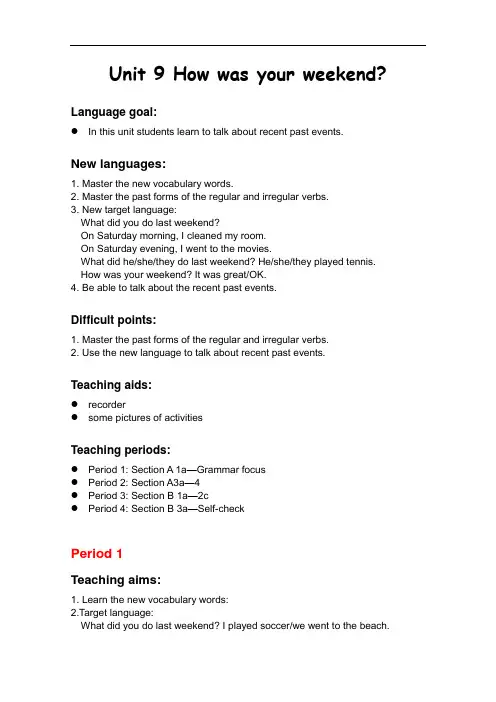
Unit 9 How was your weekend?Language goal:●In this unit students learn to talk about recent past events.New languages:1. Master the new vocabulary words.2. Master the past forms of the regular and irregular verbs.3. New target language:What did you do last weekend?On Saturday morning, I cleaned my room.On Saturday evening, I went to the movies.What did he/she/they do last weekend? He/she/they played tennis. How was your weekend? It was great/OK.4. Be able to talk about the recent past events.Difficult points:1. Master the past forms of the regular and irregular verbs.2. Use the new language to talk about recent past events.Teaching aids:●recorder●some pictures of activitiesTeaching periods:●Period 1: Section A 1a—Grammar focus●Period 2: Section A3a—4●Period 3: Section B 1a—2c●Period 4: Section B 3a—Self-checkPeriod 1Teaching aims:1. Learn the new vocabulary words:2.Target language:What did you do last weekend? I played soccer/we went to the beach.What did he do last weekend? He played tennis.What did they do last weekend? They visited the library.3. Master the past forms of the regular and irregular verbs.4. Learn to talk about recent past events.Teaching procedures:Step 1. Warm-upTalk about the activities:—What’s your favorite sport?—My favorite sport is…—Do you play soccer/tennis/basketball? Yes/no…—Do you do your homework/clean your room? Yes/no...Ask and answer more activities.Step 2. Learn the new vocabulary words1. Get the students to read the new words in the vocabulary. Try to readthem by themselves.2. Practice reading the new words: (A) Ask the class to repeat the newwords after the teacher. (B) Then read them together/in parts/one by one.3. Read and remember the new words.4. Explain some words:The past forms of some irregular verbs: was; did; wentUseful expressions: have a test; stay at home; what about=how about;practice doing sth.Step 3. Presentation1. Teacher asks students: “What did you do last weekend?” Help thestudents to answer the question with the past tense. For example: Icleaned my room/ washed the clothes/played basketball/went to themovies… Accept one word answers and rephrase the answers incompleted sentences.2. Have the students work in pairs, ask the question. And try to answerwith complete sentences. Then practice asking and answering theconversation.Step 4. 1a Look and match1. The teacher reads the instructions to the students.2. Have students read the list of the activities first. Read each one and askstudents to repeat.3.Then look at the pictures and try to match the answers.4. Check up the answers.Step 5. 1b Listening practice1. The teacher reads the instructions to the students.2. Get the students to look at the pictures, and then tell what the person didin each picture inactivity1a.3. Play the recording for the first time, students only listen.4. Play the recording again. Students listen to the recording, try to fill in theday and “morning, afternoon, evening” by themselves.5. Check up the answers.6. Play the recording, let the students repeat after the recording. Thenpractice reading the conversation.Step 6. 1cPair work1. The teacher explains the instructions to the students.2.Ask two students to read the example conversation in class.3. Roles play the conversation about Lucy’s weekend in pairs.4. Have some pairs of students work to the class.Step 7. 2a Listening practice1.The teacher explains the instructions to the students.2. Get students to read the sentences in activity 2a. And explain: “You willhear a conversation. The people will talk about some activities and people. Now listen and try to underline the words you hear.3. Play the recording for the first time, students only listen.4. Play the recording again, students listen and try to underline the words.5. Check up the answers.Step 8. 2b Listening practice1. The teacher explains the instructions to the students. Look at the picturein activity 2a, learn the names of Carol; Ben and Emma. Ask students to identify each person by name.2. Look through the sentences in activity 2a.3. Play the recording. Listen and try to fill their names in the blanks.4. Listen again and check up the answers.5. Play the recording and get students to repeat after the recording.Step 9. 2cPair work1. The teacher explains the instructions to the students. Practice theconversation with the words given in the box.2. Students read the example and the words in the box. Do the activity inpairs and make their conversation.3.Ask some pairs to present the conversations in class.Step 10.Grammar focusReview the grammar box first. Then students read the sentences and find if there are some questions. If have, explain them: the past forms of theregular verbs and irregular verbs.Step 11. Summary1. The new vocabulary words.2. The new target language.3. The regular and irregular verbs.Step 12.Homework1. Remember the vocabulary words.2. Write a passage about your last weekend by using the past tense.Period 2Teaching aims:Learn to talk about the past events using the past tense.Teaching procedures:Step 1. Warm-up1. Check up the homework.2. Get some students to read their passages about the past events.3. Talk about your last weekend in pairs.Step 2. Presentation1. Show the picture of a mountain. Teach the word “mountain”.Have the students read the word.2. Make a conversation between the teacher and the students.For example: T: How was your weekend?S: It was great/OK/ not very good.T: What did you do last weekend?S: I…3. Then practice the conversation.Step 3. 3a Writing and speaking practice1. The teacher reads the instructions to the students.Get the students to read three sentences first.2. Students look at the picture and complete the conversation bythemselves.3. Check up the answers.4. Practice the conversations in pairs.Step 4. 3b Pair work1. The teacher reads the instructions to the students.2. Get two students to read the conversation in speech bubbles.3. Practice asking and answering the questions about Ming’s, Tony’s andSarah’s weekends. Practice in pairs.A: How was Ming’s weekend?B: It was …A: What did she do?B: She …4. Have some pairs work in class.Step 5.Game-What did you do?1. Teacher explains the instructions to the students. Be sure the studentscan know what to do.2. Do an example for the students.Draw a picture of a TV, students guess “watched TV”.Draw a picture of a book, studen ts guess “did some reading”.3. Ask students to work in groups. Each student draws two things.Then take turns to make sentences about each other’s picture with pasttense.4. Get some students to work it to the class.Step 6.Summary●Talk about the past events.Step 7.Homework●Interview a friend of yours, ask what he/she did last weekend and write apassage on your notebook.Period 3Teaching aims:1. Learn the new vocabulary words and useful expressions.2. Learn the past forms of some irregular verbs.3. Learn to talk about the past events.Teaching procedures:Step 1.Warm-up1. Check up the homework.2. Get some students to read their passages about what your friend did lastweekend.Step 2. 1a 1b Match and say1. Get the students to look at the pictures, read the phrases and try tomatch.2. Look at the pictures and check up the answers.3. 1b. Teacher explains the instructions to the students. Be sure thestudents can know what to do. Draw a happy face under the picture if you think the activity is fun. Draw an unhappy face if not fun.4. Let the students say it to the class.He played the guitar. It was fun.He did his homework. It wasn’t fun.Step 3. 2a 2b Listening, writing and speaking practice2a1. The teacher reads the instructions to the students. Tell the students: Youwill listen to a conversation between Jim and Sally. They are talking about what they did last weekend. Listen and write the activities in the chart.2. Play the recording for the first time, students only listen. Play therecording,3. Play the recording again, try to fill in the chart when you hear.4. Check up the answers.Students look at the typescript, and repeat after the recording.2b5.The teacher explains the instructions to the students.6. Look at the example in the speech bubbles. Ask two students to read theconversation.7. Practice talking about what Sally and Jim did last weekend in pairs.8. Ask some pairs of students to work in class.Step 4. 2cPair work1.The teacher reads the instructions to the students.2. Get two students to read the conversation in the speech bubbles.3. Have the students work in pairs. Ask your partner “what did you do lastweekend?” and make a conversation.4.Ask some pairs of students to present the conversation in class.Step 5.SummarySummarize the useful expressions and the past forms of the irregular verbs. Step 6.Homework1. Remember the useful expressions and the past forms of the irregular verbs.2. Write down a passage about what your partner did last weekend.Period 4Teaching aims:1. Learn the new vocabulary words and useful expressions.2. Learn the past forms of the irregular verbs.3. Learn to talk about the past events.4. Train the reading and writing abilities.Teaching procedures:Step 1. Warm-up1. Check up the homework.2. Get some students to read their passage about what your partner didlast weekend.Step 2. Learn the new vocabulary words1. Get all the students to look at the vocabulary words. Try to read the newwords by themselves. Then the teacher gets one student to read the new words.2. Practice reading the new words. (A) Read the words after the teacher.(B) Read them together/in parts/one by one.3. Read the new words and remember them.Step 3. 3a Reading practice1. The teacher reads the instructions to the students.2. Ask the students to read the article. Circle the activities you like andunderline the activities you don’t like.3. The teacher reads the article to the students and checks up theanswers.4. Students read the article again and find their questions. Explain to themif they have.Step 4. 3b Writing practice1. Get the students to look at the pictures first. Then read the passage andtry to fill in the blanks according to the pictures. Attentions to use thepast tense.2. Get one student to read the passage and check up the answers.3. Students read the article again and find their questions. Explain to themif they have.Step 5. 3cWriting practice1.The teacher explains the instructions to the students.2. Get the students to write their own passages. Get help from activity 3b.3. Then correct your ads with your partner. The teacher can help them ifthey have some questions. Get a few students to read their passage to the class.Step 6.GameActivity 41.The teacher explains the instructions to the students.2. Have students work in groups of four. Ask one student to write theactivities he did last weekend. Then talk to the others about his weekend activities. And the others try to guess who he is.3. Have students to work in groups. Take turns to talk about the weekendactivities and guess who he/she is.4. Have some groups of students present their conversations in class.Step 7. Review the words Self-check 1&21. Students read the words in the box and check all the words they know.They can circle the words they don’t know. Then ask them.2. Make their Chinese meanings clear.Then ask and answer the Chinese meanings in pairs or in groups.3.Ask each student to write five new words on their notebooks.Then share them with the others in groups.Step 8.Self-check 3 Reading and writing practice1. The teacher explains the instructions to the students. Tell the studentswhat to do.2. Students read th e passage about “Old Henry”. And find his problems.3. Tell students that they have to image that they went and helped OldHenry last weekend. Think about the activities they could help him. They can get some help from the suggestion box.4. Students write their own answers. After finishing, ask some students toread their passages to the class.Step 9.Summary1. Summarize the new words and the useful expression2. The past forms of the irregular verbs.3. Talk about the past events.Step 10.Homework1. Remember the words and expressions.2. Write a passage about the activities your family members did last weekend.。
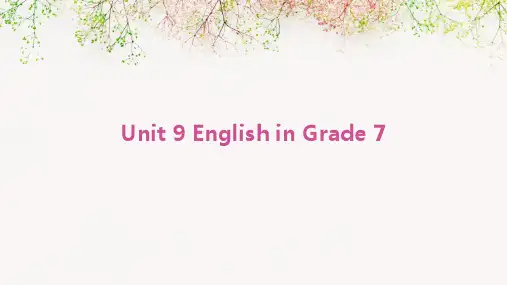
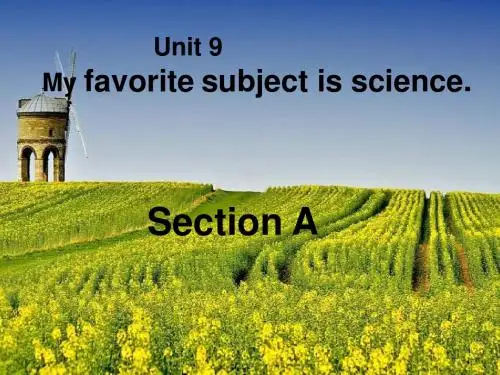
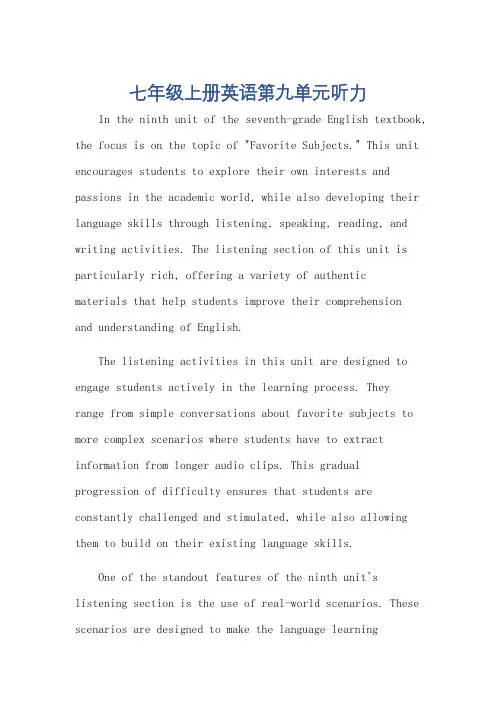
七年级上册英语第九单元听力In the ninth unit of the seventh-grade English textbook, the focus is on the topic of "Favorite Subjects." This unit encourages students to explore their own interests and passions in the academic world, while also developing their language skills through listening, speaking, reading, and writing activities. The listening section of this unit is particularly rich, offering a variety of authenticmaterials that help students improve their comprehensionand understanding of English.The listening activities in this unit are designed to engage students actively in the learning process. Theyrange from simple conversations about favorite subjects to more complex scenarios where students have to extract information from longer audio clips. This gradual progression of difficulty ensures that students are constantly challenged and stimulated, while also allowing them to build on their existing language skills.One of the standout features of the ninth unit's listening section is the use of real-world scenarios. These scenarios are designed to make the language learningprocess more relevant and engaging for students. By listening to authentic English conversations, students are able to gain insights into how the language is used inreal-life situations, which helps them to apply their learning more effectively in real-world contexts.Another noteworthy aspect of the listening section is the emphasis on comprehension skills. Throughout the unit, students are required to listen carefully to audio clips and answer questions that test their understanding of the content. This focus on comprehension not only helps students improve their listening skills but also enhances their ability to extract key information from texts, a crucial skill in academic and professional settings.The integration of speaking and listening skills is another highlight of the ninth unit. By encouraging students to discuss their favorite subjects and share their opinions with peers, the unit promotes active language use and enhances students' fluency and confidence in speaking English. These speaking activities are often followed by listening exercises where students have to listen to aconversation or monologue and respond to it, further reinforcing the connection between speaking and listening. Overall, the listening section of the ninth unit of the seventh-grade English textbook is a comprehensive and engaging resource that helps students develop their language skills while exploring their interests and passions. By exposure to authentic materials and real-world scenarios, students are able to gain a deeper understanding of English and its application in real-life contexts, laying the foundation for future academic and professional success.**七年级上册英语第九单元听力探索**在七年级英语课本的第九单元中,主题是“最喜欢的科目”。
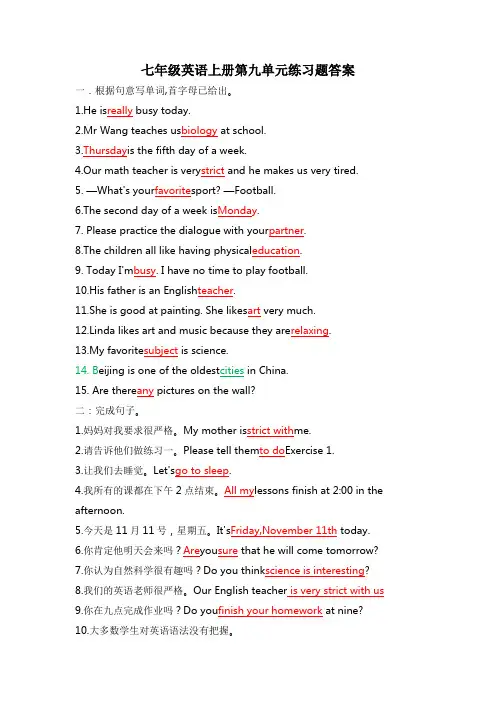
七年级英语上册第九单元练习题答案一.根据句意写单词,首字母已给出。
1.He is really busy today.2.Mr Wang teaches us biology at school.3.Thursday is the fifth day of a week.4.Our math teacher is very strict and he makes us very tired.5. —What's your favorite sport? —Football.6.The second day of a week is Monday.7. Please practice the dialogue with your partner.8.The children all like having physical education.9. Today I'm busy. I have no time to play football.10.His father is an English teacher.11.She is good at painting. She likes art very much.12.Linda likes art and music because they are relaxing.13.My favorite subject is science.14. B eijing is one of the oldest cities in China.15. Are there any pictures on the wall?二:完成句子。
1.妈妈对我要求很严格。
My mother is strict with me.2.请告诉他们做练习一。
Please tell them to do Exercise 1.3.让我们去睡觉。
Let's go to sleep.4.我所有的课都在下午2点结束。
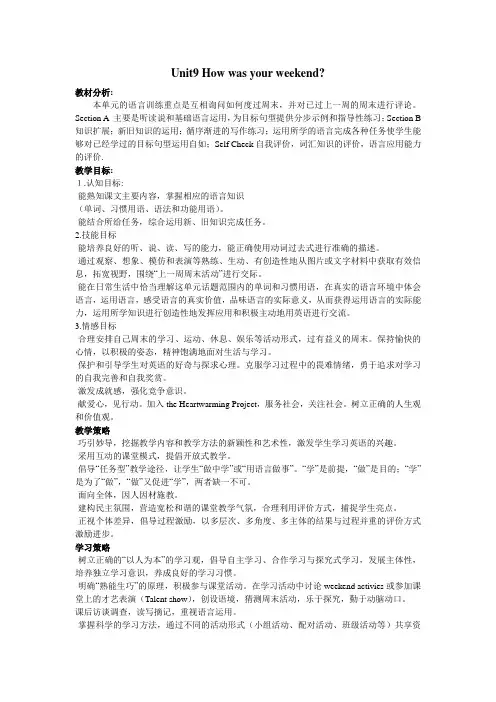
Unit9 How was your weekend?教材分析:本单元的语言训练重点是互相询问如何度过周末,并对已过上一周的周末进行评论。
Section A 主要是听读说和基础语言运用,为目标句型提供分步示例和指导性练习;Section B 知识扩展;新旧知识的运用;循序渐进的写作练习;运用所学的语言完成各种任务使学生能够对已经学过的目标句型运用自如;Self Check自我评价,词汇知识的评价,语言应用能力的评价.教学目标:1.认知目标:·能熟知课文主要内容,掌握相应的语言知识(单词、习惯用语、语法和功能用语)。
·能结合所给任务,综合运用新、旧知识完成任务。
2.技能目标·能培养良好的听、说、读、写的能力,能正确使用动词过去式进行准确的描述。
·通过观察、想象、模仿和表演等熟练、生动、有创造性地从图片或文字材料中获取有效信息,拓宽视野,围绕“上一周周末活动”进行交际。
·能在日常生活中恰当理解这单元话题范围内的单词和习惯用语,在真实的语言环境中体会语言,运用语言,感受语言的真实价值,品味语言的实际意义,从而获得运用语言的实际能力,运用所学知识进行创造性地发挥应用和积极主动地用英语进行交流。
3.情感目标·合理安排自己周末的学习、运动、休息、娱乐等活动形式,过有益义的周末。
保持愉快的心情,以积极的姿态,精神饱满地面对生活与学习。
·保护和引导学生对英语的好奇与探求心理。
克服学习过程中的畏难情绪,勇于追求对学习的自我完善和自我奖赏。
·激发成就感,强化竞争意识。
·献爱心,见行动。
加入the Heartwarming Project,服务社会,关注社会。
树立正确的人生观和价值观。
教学策略·巧引妙导,挖掘教学内容和教学方法的新颖性和艺术性,激发学生学习英语的兴趣。
·采用互动的课堂模式,提倡开放式教学。
·倡导“任务型”教学途径,让学生“做中学”或“用语言做事”。
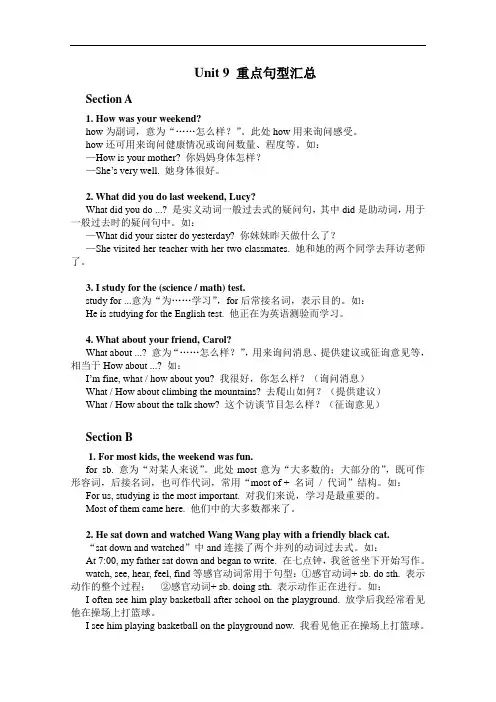
Unit 9 重点句型汇总Section A1. How was your weekend?how为副词,意为“……怎么样?”。
此处how用来询问感受。
how还可用来询问健康情况或询问数量、程度等。
如:—How is your mother? 你妈妈身体怎样?—She’s very well. 她身体很好。
2. What did you do last weekend, Lucy?What did you do ...? 是实义动词一般过去式的疑问句,其中did是助动词,用于一般过去时的疑问句中。
如:—What did your sister do yesterday? 你妹妹昨天做什么了?—She visited her teacher with her two classmates. 她和她的两个同学去拜访老师了。
3. I study for the (science / math) test.study for ...意为“为……学习”,for后常接名词,表示目的。
如:He is studying for the English test. 他正在为英语测验而学习。
4. What about your friend, Carol?What about ...? 意为“……怎么样?”,用来询问消息、提供建议或征询意见等,相当于How about ...? 如:I’m fine, what / how about you? 我很好,你怎么样?(询问消息)What / How about climbing the mountains? 去爬山如何?(提供建议)What / How about the talk show? 这个访谈节目怎么样?(征询意见)Section B1. For most kids, the weekend was fun.for sb. 意为“对某人来说”。
此处most意为“大多数的;大部分的”,既可作形容词,后接名词,也可作代词,常用“most of + 名词/ 代词”结构。
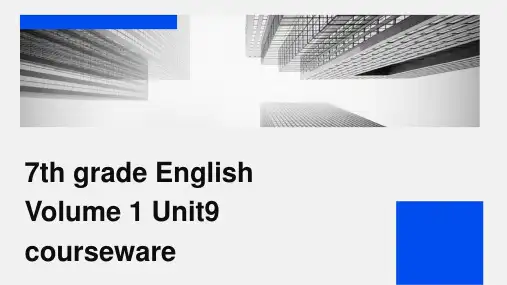
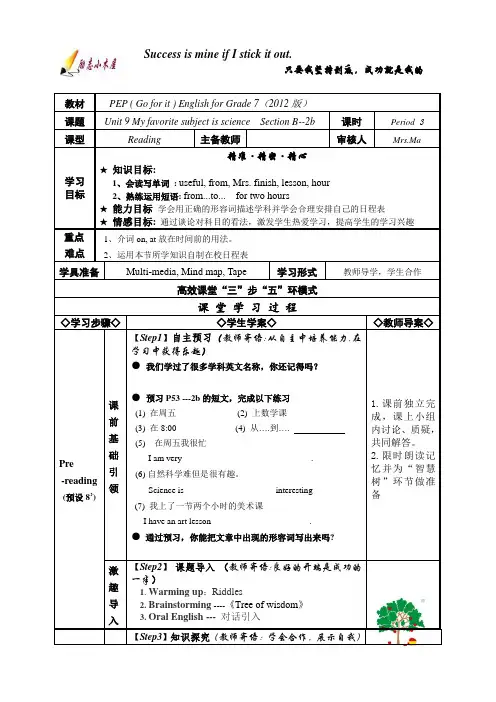
Success is mine if I stick it out.只要我坚持到底,成功就是我的【Step3】知识探究(教师寄语:学会合作,展示自我)教材PEP ( Go for it ) English for Grade 7(2012版)课题 Unit 9 My favorite subject is science Section B--2b 课时 Period 3 课型Reading主备教师审核人Mrs.Ma学习 目标精准·精密·精心★ 知识目标:1、会读写单词 : useful, from, Mrs. finish, lesson, hour2、熟练运用短语: from...to... for two hours★ 能力目标 学会用正确的形容词描述学科并学会合理安排自己的日程表★ 情感目标: 通过谈论对科目的看法,激发学生热爱学习,提高学生的学习兴趣 重点 难点1、介词on, at 放在时间前的用法。
2、运用本节所学知识自制在校日程表学具准备 Multi-media, Mind map, Tape 学习形式教师导学,学生合作高效课堂“三”步“五”环模式课 堂 学 习 过 程◇学习步骤◇ ◇学生学案◇◇教师导案◇Pre -reading(预设8’)课前 基础 引 领【Step1】自主预习(教师寄语:从自主中培养能力,在学习中获得乐趣) ● 我们学过了很多学科英文名称,你还记得吗? ____________________________________● 预习P53 ---2b 的短文,完成以下练习 (1) 在周五__________ (2) 上数学课 _________ (3) 在8:00 __________ (4) 从….到…. _______(5) 在周五我很忙I am very __________ _______ ___________. (6) 自然科学难但是很有趣。
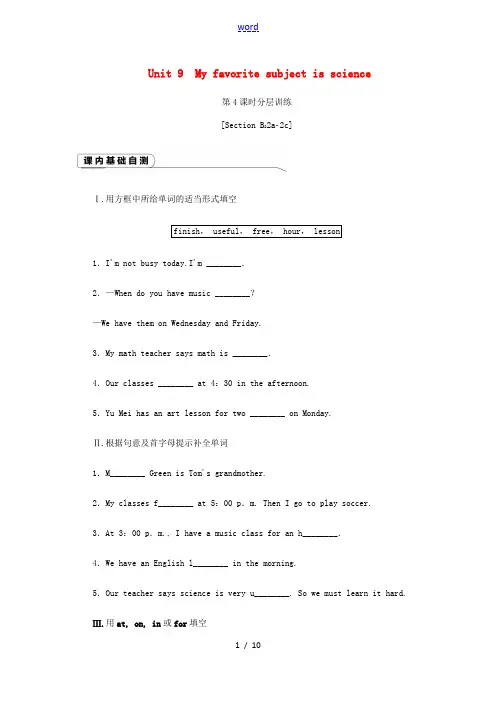
Unit 9 My favorite subject is science第4课时分层训练[Section B22a2c]Ⅰ.用方框中所给单词的适当形式填空finish, useful, free, hour, lesson1.I'm not busy today.I'm ________.2.—When do you have music ________?—We have them on Wednesday and Friday.3.My math teacher says math is ________.4.Our classes ________ at 4:30 in the afternoon.5.Yu Mei has an art lesson for two ________ on Monday.Ⅱ.根据句意及首字母提示补全单词1.M________ Green is Tom's grandmother.2.My classes f________ at 5:00 p.m. Then I go to play soccer.3.At 3:00 p.m., I have a music class for an h________.4.We have an English l________ in the morning.5.Our teacher says science is very u________. So we must learn it hard. Ⅲ.用at, on, in或for填空1.What classes do you have________ Friday morning? 2.I play volleyball________ an hour every day. 3.We have art________ Monday.4.Do you have a music festival________ June?5.The soccer game is________ 2:30 in the afternoon. Ⅳ.从Ⅱ栏中找出与Ⅰ栏相对应的答语Ⅰ( )1.How is your day?( )2.This puter game is boring.( )3.When does Jane have lunch?( )4.What are your favorite subjects?( )5.Who do you often play basketball with?ⅡA.That's for sure.B.It's great.C.Math and science.D.My classmates.E.At 12:30.Ⅰ.单项填空( )1.________ Friday, we have science ________ 10:00 to 11:00. A.On; on B.From; atC.On; from D.On; at( )2.We often play games ________ two hours after school.A. for B.in C. at D. on( )3.—Can you finish________ these books before 10 o'clock?—Yes, I can.A.to read B.readC.reads D.reading( )4.I think English is ________ useful subject.A.an B.a C. the D./( )5.—________ will Mrs. Lin go to Germany?—To see her daughter there.A.How B.When C.Why D.What( )6.He likes playing puter games _____________________________his friends. A.with B.to C.and D.for( )7.Thanks for________ me with my science.A.help B.to helpC.helping D.your help( )8.When ________ the girl ________ her homework? A.does; does B.does; doC.do; does D.do; do( )9.This is ________ Li.That is her son.A.Miss B.Mrs. C.Mr. D./( )10.—Would you like to have dinner with me? —________ I'll be there.A.Thank you. B.That's for sure.C.That's all right. D.Yes, please.Ⅱ.对画线部分提问,每空一词1.Jim's favorite movie star is Jackie__Chan.________ is Jim's favorite movie star?2.It's Sunday today.________ ________ is it today?3.He likes science because__it's__interesting.________ ________ he like science?4.I have music on__Monday__and__Friday.________ ________ you have music?5.He usually has P.E. in the afternoon.________ ________ ________ he usually________ in the afternoon?Ⅲ.根据汉语意思完成句子1.周二你们有数学课吗?________ you have math ________ ________?2.从图书馆到教室大约是500米。
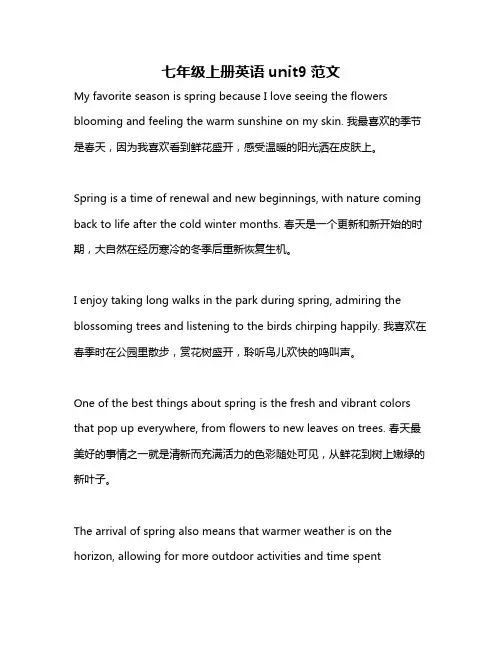
七年级上册英语unit9范文My favorite season is spring because I love seeing the flowers blooming and feeling the warm sunshine on my skin. 我最喜欢的季节是春天,因为我喜欢看到鲜花盛开,感受温暖的阳光洒在皮肤上。
Spring is a time of renewal and new beginnings, with nature coming back to life after the cold winter months. 春天是一个更新和新开始的时期,大自然在经历寒冷的冬季后重新恢复生机。
I enjoy taking long walks in the park during spring, admiring the blossoming trees and listening to the birds chirping happily. 我喜欢在春季时在公园里散步,赏花树盛开,聆听鸟儿欢快的鸣叫声。
One of the best things about spring is the fresh and vibrant colors that pop up everywhere, from flowers to new leaves on trees. 春天最美好的事情之一就是清新而充满活力的色彩随处可见,从鲜花到树上嫩绿的新叶子。
The arrival of spring also means that warmer weather is on the horizon, allowing for more outdoor activities and time spentenjoying the sunshine. 春天的到来也意味着温暖的天气即将来临,可以进行更多的户外活动,享受阳光。
Unit 9 My favorite subject is science.Period 4 (Section B 2a–Self Check)【教学目标】●知识目标1. Master the new words and useful expressions.2. Master some key sentences.●能力目标Get students able to discuss activities and write notes.●情感目标Make students cherish their time at school.【教学重难点】●重点1. Master the new words and useful expressions.Words and expressions: fun, busy, time, class, lesson, finish, for, be OK with ..., thank you for ..., holiday, National Day, discuss, invite … to …2. Master the key sentences.(1) At 8:00 I have math.(2) The teacher says it is useful, but I think it is difficult.(3) It is difficult but interesting.(4) It is easy and fun.(5) Our Chinese teacher, Mrs. Wang, is great fun.(6) My classes finish at 1:50, but after that I have an art lesson for two hours.●难点Talk about activities and write notes.【教学准备】A tape recorder, a projector and handouts.【教学方法】任务型教学法、情景交际法、自主学习与合作学习相结合【课时安排】One period【教学过程】Step 1: Warm-up1. Review the words and expressions in the last period.2. Ask students to talk about David's favorite subjects.3. Ask students to work with their partners and talk about their favorite subjects.Step 2: Presentation1. Teach activity 2a(1) Ask students to read the subjects in 1a and write a description to each one.(2) Show a picture of history book and invite one students to describe his opinion.T: What do you think of history?S: It's boring.(3) Ask students to work with their partners and make conversations like the one above.(4) Invite some pairs to act out their conversations.2. Teach activity 2b(1) Lead students to read the letter from Yu Mei to Jenny.(2) Ask students to read the letter carefully and underline the subjects Yu Mei likes and circle the subjects she doesn't like.(4) Invite several students to read their answers and check the correct answers.(5) Ask students to read the letter carefully and answer the followingquestions.—What does Yu Mei do at 8:00?—She has math at 8:00.—What does Yu Mei do at 9:00?—She has science at 9:00.—What does she think of science?— She thinks science is difficult,but interesting.④—What’s her favorite subject?—Her favorite subject is Chinese.⑤— Who is her Chinese teacher?— Her Chinese teacher is Mrs. Wang.⑥—How does she feel about art lesson?— She feels that it is really relaxing.⑦—How long does she have art lesson after class?—She has the art lesson for two hours.(6) Ask students try to retell the letter.3. Teach activity 2c(1) Ask students to read the letter carefully and plete Yu Mei's schedule with the information in 2b.(2) Invite several students to tell their answers.(3) Check the correct answers with the whole class.Step 3: Practice1. Teach activity 3a(1) Ask students to read the passage themselves and then number these parts of an massage [1-3].(2) Invite one student to tell his\her answers.(3) Check the correct answers with the whole class.(4) Adapt the into a conversation and perform it.(5) Move around and give some help if necessary.2. Teach activity 3b(1) Ask students to fill in the blanks in 3b according to their school schedule on Friday.(2) Invite several students to tell their answers.(3) Ask students to make their own conversations according to the blank.(4) Give students an example.A: What subject do you have on Friday?B: Chinese.A: What time is it?B: It's at 8:00 P.M.(5) Invite some students to act out their conversations.3. Teach activity 3c(1) Ask students to write an massage to their friends about their Friday.(2) Give students enough time to write the .(3) Choose several s and read to other students and correct their mistake. Step 4: ConsolidationSelf Check1. Activity 1(1) Lead students to read the instructions and make sure they know what to do.(2) Ask students to add more words to each column.(3) Invite some students to tell their answers and ask other students to makea plement.2. Activity 2(1) Lead students to read the instructions and make sure they know what to do.(2) Ask students to plete the questions with what, who,when or why.(3) Invite some students to tell their answers and check the correct answers with the whole class.(4) Ask students to answer the questions.【课堂小结】In this period, we’ve learned how to talk about our routines and how to write schedules through some reading and writing practice. And we’ve also consolidated the target language and the use of wh-questions.【课后作业】Write a passage about your favorite subject and the passage must include the following points.1.What’s your favorite subject?2.Why do you like it?3.When do you have your favorite subject?。
人教版精品英语资料(精校版)Unit 9 My favorite subject is science.Part 1: Teaching design (第一部分:教学设计)SECTION AGoals●To teach the students what questions, why questions●To let the students talk about their favorite subjectsProceduresWarming up by learning about wh-questionsWhat is a wh-question?DefinitionA wh-question is a question that contains an interrogative proform.Also known as: Content question, question word question, information questionExamples (English)Here are some examples of words that begin wh-questions in English. Most of them begin with wh-: who ; what ; when ; where ; why ;Warming up by discussingT: Good morning, everyone! We’re going to have our English class. You have many subjects everyday. Subject is the lesson you learn everyday, such as English, math,Chinese and so on. Maybe you think some of them are interesting and so youare good at them. But some are not. Right?S:Yes…T:Now let’s see how many subjects we have everyday.S: Math, English, Chinese, art, music, geography, P.E.…T: And we have science. Science includes chemistry, physics and geography and so on.1a Matching the words with the picturesLook at the picture on page49, there are many subjects in the picture. Please match the words with picture.1b Listening and circling the subjects you hear in 1aWe have many different subjects everyday. Now let’s listen to the tape and ci rcle the subjects you hear in 1a.Read the tapescript to underline the wh-question.1c.Doing pairworkI think you must have your favorite subjects. Please practice the conversationbelow. First read after me and practice it with your partner. I will ask some pair toact it out.Then make your own conversations with your partner like this:2a Listening and putting in order.Listen to the tape and please put the conversation in order. First you just listen and then put them in order. Can you try to place the sentences in right order?2b Listening and matchingYou will hear the conversation. In the conversation, people talk about school subjects. Listen and matching the subjects you hear with the description words.2cThinking and matchingNow what do you think of your subjects? You can give your opinion. You can practice this conversation first.Then you can make up your conversation with your partners and match the subjects with thedescription words.The answers may be like this:OK, stop! Now please make a conversation using the information in 2a.2d Role-playRead the conversation below, then practice in pairs.Afer a several minutes, I ’ll ask some of you to perform the conversation.3a Filling in the blanks.Fill in the blanks with what, who or why to complete the conversations.3b Writing questons for the answers.Use the setense partern of “what, who or why ” to complete 3b.3c Groupwork1.Ask and answer questions about your favorite subject in the class..2.Fill the chart.SECTION BGoals● To go on talking about favorite subjects● To learn the days of week and the expressions of datesProceduresWarming up by talking about the dateT: Boys and girls! Today we’re going to learn a new part Section B. By theway, what day is it today?S: It’s Tuesday.T: What’s the date today?S: It’s October 9.T:Oh! I see. Let’s open you book and turn to Page52, and learn 1a.1a MatchingLook at your book and find the opposite words for the left words:1b&1c Listening andCheckingNow listen to the tape for 3 times. The first time you have to check the words you hear in 1a. Then listen again and circle the classes David talks about on the schedule in 1c. The third time, you have to check the answers.1d Doing pairworkLook at the schedule in 1c and talk about David’s favorite subject with your partners. Then talk about your favorite subject in pairs.2a WritingThere list some subjects you have learned in school. Write a description for each one.2b Reading and circlingLet’s read the following letter. Underline the things Yu Mei likes. Circle the things she doesn’t like. While reading you should pay attention to the pronunciations and intonation and underline the expressions.2c Completing scheduleWe have read Yu Mei’s letter in 3a. h ere is Yu Mei’s schedule. Please complete it with the information from 3a. Then we have a clear look about what she does on that day.3a NumberingNumber these parts of an e-mail massage.3b&3c WritingI know you all have busy days. What is your favorite school day? Write your schedule for that day ,then write a e-mail massage to a friend of you.Closing down by playing a guessing gameLet’s play a guessing game.We can play it like this: One student does some actions about one of subjects. And the other s guess what subject it is. Let’s see who can guess the most subjects.SELF CHECK1 WritingWrite out the subjects you have at school and your feelings about them. Thenmake a dialogue as 1d.S2 Filling the blanksComplete the questions with what, when, who or why. Then answer thequestions.Closing down by making a lectureI think everyone has a favorite subject and has his reasons too. Let’s talk about “my favorite subject”. You have five minutes to prepare. Then stand up to give your lecture to us. You can use body language when needed.Let’s learn some names of English songs.Honkey Pokey; How Is The Weather?(天气怎么样?); I Love Little Pussy(我喜欢小猫); I’M A Little Teapot(我是一把小茶壶); If You're Happy(如果你感到快乐); Jimmy Crack Corn (撬开裂纹玉米); Jingle Bells(铃儿响叮当<1>); Jingle Bells(铃儿响叮当<2>); Lazy Mary(懒惰的玛丽); Let Everyone Clap Hands(让每一个人拍手); Let Us Sing Together (让我们一起唱歌); Little Cabin In The Wood(森林中的小木屋); Little Goldfish(小金鱼); Little Green Frog(绿色的小青蛙); Little Peter Rabbit(小兔彼得); Make New Friends (结识新朋友); My Aunt Came Back(我的姑妈回来了); My Brother And I(我的哥哥和我); Oh, Christmas Tree(哦,圣诞树); Oh, Susanna(噢,苏珊娜);Pat A Cake(做个面包); Pop!Goes The Weasel(砰!追逐鼹鼠!); Rain, Rain, Go Away(雨,雨,走开); Reuben Reuben(鲁宾); Roll That Bal(滚动那个球); Round The Clock(围着时钟转); Sally, Go'Round The Sun(萨利绕着太阳转); Sea Shells(海洋贝壳); She'll Be Comin' Round The Mountain(她将绕过这座山脉过来); Simple Simon(头脑简单的西蒙); Sing Together(一起歌唱); Six Little Ducks(六只小鸭子); Smile(微笑); Ten Fat Sausages(十根肥香肠); The Ants Go Marching(蚂蚁在行军); The Bear Went Over The Mountain(小熊上了山); The Family(家庭); The Farmer In The Dell(农夫在小山谷中); The Finger Family(手指家庭); The Months(月份); The More We Get Together(我们在一起越多)Part 2: Teaching Resources (第二部分:教学资源)I. Background readings——Time (美国人的时间观)What is time? Is it a thing to be saved or spent or wasted, like money? Or is itsomething we have no control over, like the weather? Is time the same allover the world? That's an easy question, you say. Wherever you go, a minute is60 seconds, an hour is 60 minutes, a day is 24 hours, and so forth. Well, maybe.But in America, time is more than that. Americans see time as a valuable resource. Maybe that's why they are fond of the expression, "Time is money."Because Americans believe time is a limited resource, they try to conserve and manage it. People in the U.S. often attend seminars or read books on time management. It seems they all want to organize their time better. Professionals carry around pocket planners-some in electronic form-to keep track of appointments and deadlines. People do all they can to squeeze more life out of their time. The early American hero Benjamin Franklin expressed this view best: "Do you love life? Then do not waste time, for that is the stuff life is made of."To Americans, punctuality is a way of showing respect for other people'stime. Being more than 10 minutes late to an appointment usually callsfor an apology, and maybe an explanation. People who are running lateoften call ahead to let others know of the delay. Of course, the less formal the situation, the less important it is to be exactly on time. At informal get-togethers, for example, people often arrive as much as 30 minutes past the appointed time. But they usually don't try that at work.II.Fun materials——Holes and coversOnce San Diego was badly flooded. Some residents suggested removing manhole covers tospeed up the draining of rain flooded streets. That sounded a good idea. However, it made matters worse because the underground system was flooded too. Several covers became lost in knee-deep water, and police were called in to help.“we’re picked up the lost covers all right.” One officer asked headquarters. “Now how do we find the hole s?”Back came the order: “That’s easy. Walk till you fall in.”III Word studies1.strict(stricter, strictest)a. 1.严格的;严谨的精确的;正确的exact; accurate: The men who make the parts of an airplane must use strict measurements. 制造飞机零件的工人必须使用精确的量具。
Unit 9 My favorite subject is science.话题Topic 学校科目School subjects功能Functions 1.能够就喜欢的事物进行简单的问答Talk aboutpreferencesA:What ’s your favorite subject/day? B:My favorite subject/day is …2.能够询问并陈述喜欢某事物的原因Give reasonsA:Why do you like …?B:Because it ’s fun/interesting.语法Grammar 能够正确使用下列Wh-疑问句及回答Wh-questionsA:What ’s your favorite subject?B:My favorite subject is math. A:Why do you like math?B:Because it ’s interesting.A:Who is your math teacher?B:My math teacher is Mrs.Wang.词汇和 1.能够正确使用下列词汇Curriculum words常用表达Words &expressions 名词:subject, science, P.E., music, math, Chinese, geography, history, Monday, Tuesday, Wednesday, Thursday, Friday, Saturday, Sunday, lesson, hour; 形容词:favorite, free, cool, useful;动词:finish;副词:why;介词:from;连词:because;其他:Mrs.2.能够正确使用下列常用表达Useful expressions favorite subject, from…to…, play games with…,How’s your day? That’s great! That’s for sure.How about you?3.能够认读下列词汇Non-curriculum wordsA.M.(=a.m.), P.M.(=p.m.)学习策略Strategies 1.进一步学习在听力和阅读过程中捕捉关键词:疑问词、学科名称等2.能够通过总结Wh-疑问句的用法, 初步培养复习、归纳知识的意识, 发展自主学习的能力文化知识Culture 1.了解中西方中学学制和学科设置的知识2.了解星期的小常识三维目标Three-dimensionaltarget 知识与技能1.能掌握以下单词:favorite, subject, science, P.E.,music, math, Chinese, geography, history, why,because, Monday, Friday, Saturday, free, cool,Tuesday, Wednesday, Thursday, Sunday,A.M.,P.M., useful, from, Mrs., finish, lesson, hour2.熟练掌握以下短语:for sure, from…to, havehistory,favorite subject, play games with…3.能掌握以下句型:A:What’s your/her/his/David’s favorite subject? B:My/Her/His/David’s favorite subject is science.三维目标Three-dimensionaltarget 知识与技能A:Why does Bob like history?B:Because it’s interesting.A:Why do they like P.E.?B:Because it’s fun.A:Who is your music teacher?B:My music teacher is Ms.Xie.4.掌握以下语法:学习和巩固Wh-疑问句;熟练谈论表示喜好以及表述理由的句型。
Unit 9 My favorite subject is sci ence. The Third Period (Section B, 1a –2b)Teaching aims and language points:1. Learn these words a nd expressions, and be able to say, read and write them: ● free, cool, A.M., P.M., useful, from, from ... to ..., Mrs. , lesson, hour2. Learn these words and expressions, and be able to say and read them: ● left, right, opposite, schedule, description, the same as3. Be able to talk about subjects, lessons and teachers by using ● --What do you think of music? ● --It's relaxing.● --When is the class? It's on Monday. ● --When does Yu Mei have Chinese? ● --She has Chinese from 8:00 to 8:50.Teaching steps:1. Warm-up. (课堂热身)Daily greeting to the students (日常问候) 2. Revision and presenta tion.(1) Show a picture of a music book. Ask the Ss: T: What subject is it?Ss: It ’s music.Get the Ss to listen to a piece of music. Then ask:T: What do you think of music? Help them to answer. Ss: It ’s relaxing.(2) Show a picture of a history book. Ask the Ss: T: What subject is it?Ss: It ’s history.T: What do you think of his tory?Show some pictures to lead the Ss to give answers like “It ’s easy/fun/useful ”. Present the new word useful . 3. Work on 2a.(1) Ask some of the Ss to share their ideas about different subjects. Teacher is tomake conversation with them and collect the description words they use. T: What do you think of history?Ss: I think it ’s ..T:Yes, I think so. / Oh, but I think it ’s ...(2) Revise the adjectives they may use.(3) Ma ke the Ss follow the sample and exchange ideas.2. 用图片表意,引导学生用相关的形容词来表达对计算机课程的看法,最后引入本课时的生词useful 。
用心 爱心 专心
1
Unit 9 How was your weekend ?
一、单元教材分析
本单元的语言训练重点是互相询问如何度过周末,并对已过上一周的周末进行评论。
Section A 主要是听读说和基础语言运用,为目标句型提供分步示例和指导性练习;Section B 知识扩展;新旧知识的运用;循序渐进的写作练习;运用所学的语言完成各种任务使学生能够对已经学过的目标句型运用自如;Self Check 自我评价,词汇知识的评价,语言应用能力的评价. 二、教学目标 1. 知识技能
▲能正确运用一些常用动词的过去式,如:am /is /are ----was/were ,go ----went,clean ----clean ed,do ----did,have ----had,etc
▲能用一般过去时询问同学和老师周末做了什么并能作出流利的回答,如:What did you /he /she do last weekend ? I /He /She went to the beach .
▲能用一般过去时询问同学和老师周末做了什么,过得怎么样,并能作出流利的回答,如:What did you /he /she do last weekend ? I /He /She went to the beach . How was your weekend ? It was terrible /great/very good/ OK .
▲能用一般过去时写60词左右的英文日记。
2. 情感态度
合理安排自己周末的学习、运动、休息、娱乐等活动形式,过有益义的周末。
保持愉快的心情,以积极的姿态,精神饱满地面对生活与学习。
3. 文化意识
Self check 阅读部分中讲到old Hen r y 因失去his cute dog 而悲伤不己,写到He has no dog and no family 。
借此向学生渗透在西方,狗备受宠爱和青睐的文化。
有关狗的词汇不像在汉语中,如:“狐朋狗友”“看家狗”“痛打落水狗”等都含有贬义。
拓展一些词汇,如:lucky dog (幸运的人),big dog(大亨),clever dog 聪明的小孩,伶俐的小孩子)。
Every dog has his day (人人皆有得意时)。
三、教学内容
重点词汇:beach, po ol, visit, stay, cute, test,
cook, spend, mountain, practice 以及不规则变化行为动词is, do, go, have, read, see, write ,sit 的过去式形式was, did, went, had, read, saw, wrote, sat
相关以往知识:
__________________________________________________________________ ______________________ __________________________________________________________________ 个性化教学思路及改进
建议:
____________________________________________________________________________________________________________________________________ ______________________ __________________________________________________________________ ____________________________________________
__________________________________________________________________ ______________________ __________________________________________________________________ ______________________ __________________________________________________________________ ______________________ 瞬间灵感或困惑: __________________________________________________________________ ______________________ ______________________ ________________________________________________________________________________________ ______________________
词组:go to(a place),go shopping, go for a walk with……,visit (a person),watch sb do sth,
It is time to do sth,read a book
about(history),see an interesting talk
show,study for the(math)test。
语音:掌握动词过去式规则变化中动词词尾所加的-ed 的三种不同的读音规则 (| t | | d | | id
| ) 。
语法:掌握一般过去时表示过去发生的动作或存在的状态。
通常由动词过去式表示,与表示过去的时间
状语连用。
日常交际用语:
⑴ What did you /your friend/he/she/they do last weekend?
(2) How was y our weekend?
(3) It was great!/It was OK./It wasn’t very good.
(单词的词义/词的搭配和它们在一般过去时中的用法是难点)
四、课时安排:
Period 1 (Section A: 1a,- 1c,2a-2c)
Period 2 (Section A: 3a, 3b, 4)
Period 3 (Section B: 1, 2a, 2b, 2c)
Period 4 (SectionB:3a, 3b, 3c,4)
五、分课时教案
用心爱心专心 2。